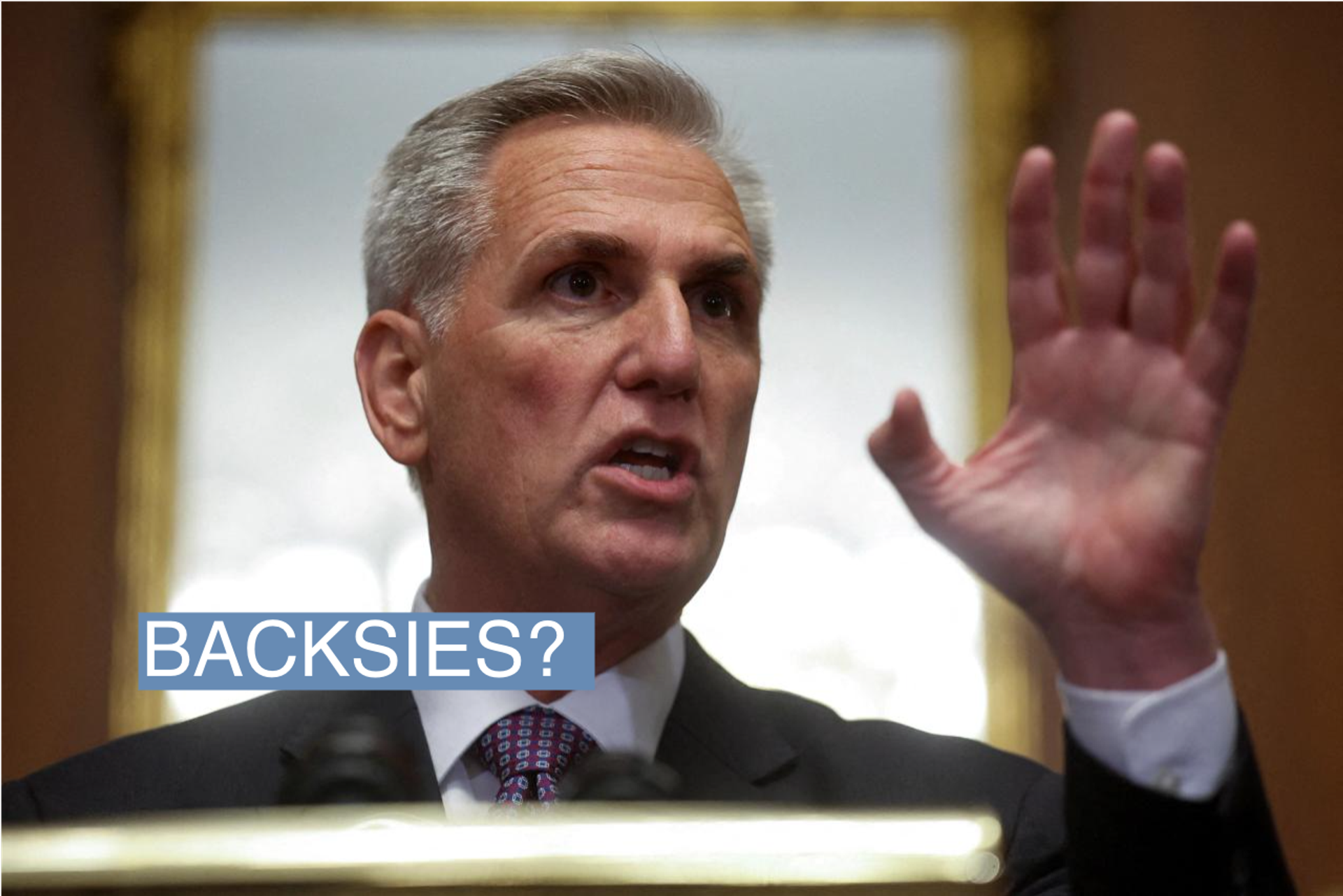The News
House Republicans are already floating a plan to cut federal spending lower than the levels outlined in their big debt ceiling deal with the Biden Administration, setting up Washington’s next high-stakes fiscal showdown just one week after passing the bill into law.
Faced with a furious conservative backlash over the legislation, GOP leaders are now suggesting they may let lawmakers write appropriations bills later this year that spend less than Congress approved under the borrowing limit agreement. The bargain with the White House put in place maximum spending caps for 2024, but Capitol Hill still needs to pass a specific budget in order to avoid an eventual government shutdown.
“The one thing you’ve got to realize, whenever you put a cap, that’s the ceiling,” Speaker Kevin McCarthy said this week. “We can always spend less. I’ve always advocated for spending less money.”
Democrats say Republicans are already attempting to renege on a carefully negotiated deal. But at least one key Senate Republican is raising an eyebrow as well, suggesting House conservatives could be headed for a broader clash with the upper chamber.
Sen. Susan Collins, ranking Republican on the Appropriations panel, said Thursday McCarthy’s spending comments caught her off guard. “I was surprised to hear the speaker say that because this was always envisioned as a cap we would go up to,” she said at a Punchbowl News live event.
Know More
McCarthy’s remarks came as he struggled to quell a revolt from the hard-right House Freedom Caucus that effectively shut down business on the chamber’s floor this week. Many conservatives are frustrated that Republicans settled for a deal with Biden that essentially held the non-defense portion of the annual budget flat next year after initially passing a party-line bill that would have slashed it by $130 billion.
Rep. Garret Graves, McCarthy’s top lieutenant throughout the debt ceiling talks, said that right-wing Republicans didn’t want to “redo” the deal with the White House, but rather were looking to “build upon it.” He suggested that spending under the current caps would be “consistent” with the original deal.
“We talked about a paradigm shift [in] how we budget in Washington,” he told Semafor. “This discussion is something that was entirely intended as part of the overall negotiations.”
Unsurprisingly, Democrats feel differently. “Speaker McCarthy and House Republican negotiators look like they’re running away from commitments they made,” Sen. Chris Van Hollen of Maryland told reporters this week. Some have already warned that a major fight could be waiting ahead.
“I think we’re at the beginning stages of a drama because the House Republican caucus has a very narrow margin,” Sen. Chris Coons of Delaware, who sits on the Appropriations panel, told Semafor. “There are clearly demonstrably a number of them who were unhappy with the deal, voted against it, and are now trying to relitigate it.”
“Good for them,” he added, sarcastically.
The View From Defense Hawks
While House conservatives have complained that the debt limit bill didn’t cut spending enough, Collins and other influential Senate Republicans have criticized the debt agreement for skimping on the Pentagon. The law would increase the defense budget 3.3% in 2024, and 1% in 2024, which the senator from Maine described as “completely inadequate.” Some Senators have already begun talking about trying to get around the caps by passing supplemental defense spending. But any effort by the House to cut domestic spending more deeply could make such a deal harder.
Another reason for defense hawks to worry: If Congress can’t approve its 12 separate appropriations bills by January 1, the debt limit law is set to impose an automatic 1% across the board cut on the annual budget, meaning the Pentagon and veterans benefits would get slashed instead of receiving a modest boost.
Joseph and Kadia’s View
Another big spending battle is starting to look almost inevitable as Congress gears up for appropriations. But if House conservatives end up picking a fight with Senate Republicans here as well as Democrats, it would set up a very different dynamic than the debt ceiling conflict, where GOP lawmakers in both chambers united behind McCarthy.
So far, House Republican leaders say they aren’t worried about a staredown with the Senate. Graves said the House and Senate will be in touch throughout the appropriations process, “but the reality is that the House gets to work its will and and we’re not going to sit here and represent the Senate’s position.”
Rules Committee chair Tom Cole, R-Okla. told Semafor that the spending caps passed in the debt limit process were “only opening positions of negotiations,” and that he thinks there’s a path forward with the Senate. “We’ll go to a conference. If they can pass their bills, you know, we have our bills and we’ll sit down together and we’ll find a middle ground.”
He was a bit more diplomatic than a GOP House aide Semafor spoke to, who said, “I do think the House is done eating what the Senate feeds us.”
Room for Disagreement
Sen. Jon Tester of Montana, who sits on the Appropriations Committee and tends to be something of an optimist, said the recent House drama hasn’t affected his calculus and he still believes it’s possible to get 12 spending spending bills through Congress by Sept. 30, the end of the fiscal year.
“I don’t think it’s changed my perspective. The House is going to do what the House is gonna do and I think we got to do our job,” Tester told Semafor. “If the House doesn’t deal with it, then we’re going to have problems but they’ll have a lot of pressure to do it if we pass it.”
